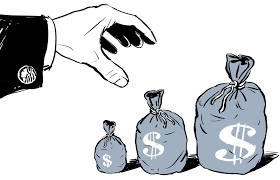The International Monetary Fund called on Uzbek authorities to take steps to expand the tax base and restore the ratio of tax revenue in GDP, the IMF mission said in a conclusion.
Reportedly, the Uzbekistan 2025 budget had adopted new tax breaks and provided for the extension of some existing ones, which undermines the growth of the tax base this year and beyond, thereby limiting the ability of tax revenues to grow proportionally to GDP.
Overall, progress in reforming the tax system was said to be limited, since tax policies in the draft budget remains largely unchanged.
The IMF recommended that the government develop a medium-term revenue strategy to offset the 2 percentage points of GDP decline in tax revenues since 2020 within three years and make the tax system more equitable. The following combination of measures can provide at least 2 percentage points of GDP:
increase specific excise taxes (on alcohol, fossil fuels, vehicles, sugar), which can provide up to 1.1% of GDP in additional revenue.
- reduce investment incentives, review incentive tax measures on profit tax and refuse to extend current ones or adopt new ones — up to 1.1% of GDP.
- cancel ineffective customs duty incentives and not to adopt new ones — up to 3.2% of GDP.
To improve the fairness of the tax system, the IMF has proposed to replace the current flat income tax rate with a progressive scale.
In the area of вАЛвАЛtax administration, in order to further expand the tax base, the Fund has recommended to focus on updating the audit program, improving the work of the large taxpayer department, and eliminating key deficiencies identified using the Tax Administration Assessment Tool (TADAT).
The IMF previously noted that tax policy options include reforming corporate and personal income taxes, reducing income-based tax incentives, and eliminating ineffective customs benefits and refusing to provide new ones.
These steps should be complemented by revenue administration measures, including revising the tax audit program and improving the performance of large taxpayer offices, as well as ensuring that taxpayers' rights are respected.
The IMF recommended that the Tax Committee Reform Strategy for 2025-2030 be approved as soon as possible. The following problems are noted among the Tax Committee's:
- insufficient access to financial data for risk assessment and verification of tax returns;
- lack of tax gap analysis to assess the risks of non-compliance with tax legislation;
- gaps in staff integrity procedures;
- lack of public opinion polls to assess trust in the Tax Committee.
The fund also praised the strategy to combat the shadow economy, noting that it could be strengthened by stimulating non-cash payments as a tool to reduce shadow activity.
As the IMF noted, it is necessary to expand the tax base and reform the tax system to create space for priority social and infrastructure needs, as well as to support the planned budget consolidation.
The authorities are working on approving strategies for reforming the tax administration for 2025-2030 and combating the shadow economy to implement the recommendations of the TADAT assessment.
Since 2019, Uzbekistan has switched to a flat personal income tax scale of 12% (the progressive rate reached 22.5%).
In May 2024, Timur Ismailov, Head of the Strategic Planning Department of the Tax Committee, did not rule out for a return to a progressive personal income tax scale. In order to abandon the flat tax scale, he emphasized the need to "form a solid tax system", noting that most foreign countries use a progressive system.
In response to a request, the Tax Committee then clarified that Timur Ismailov expressed his personal opinion. The transition to a progressive personal income tax scale is not yet part of the Tax Committee's plans, the department added.












